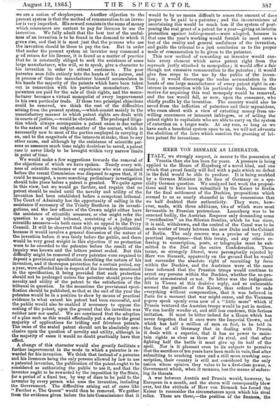THE POLICY OF PATENTS FOR INVENTIONS.
WE trust we may gather from the speech delivered a fer days since by Lord Stanley at Manchester, that the question of the policy of granting patents for inventions will be taken up in the next session of Parliament. The recent report of the Commissioners appointed to inquire into the working of the existing law as to patents embraces after all a very small part of the subject, and the value of the evi- dence taken before them is much lessened, in consequence of the inquiry having been limited to an investigation of the working of the existing law instead of being extended to the policy of the law itself. At the same time there was this advantage in the late inquiry, that everything which could be said in favour of a wiser development of the present system was certainly said. The report itself is most unsatis- factory. It recommends some useful alterations in the tribunal for trying the validity of patents, but it is silent upon the two most important questions connected with the subject, namely, the conditions upon which any protection should be extended to an inventor, and the mode in which a patentee ought to be rewarded for the services rendered by him to the public.
The difficulties arising from the present indiscriminate method of granting letters patent for inventions, and from the enormous expenditure frequently required in order to main- tain the patents when obtained, must be admitted. But it does not follow that the disease can only be cured by excision. We must be careful not to allow the sound of the words " free trade" to cause us to forget the real characteristics of the legislation which rewards, for a certain period, the citizen whose inventive faculty has been of use to the State. No law is based upon a sounder principle than the Patent Law. It encourages to the utmost the develop- ment of individual intellect, and it is particularly valuable in an age when the tendency is to reduce people more and more to a level in respect to that sort of knowledge which may be ac- quired by industrious application. It is of course not to be supposed that great discoveries in science or mechanism are in any way dependent upon such arrangements, but there can be no doubt that inventions of a humbler class are greatly promoted by the general assurance given by the law of the land to skilled workmen that their intellects are their own property, and not that of their employers. An exception in favour of new inventions was wisely inserted in the statute of James I. which abolished monopolies. A patent is in no true sense a monopoly. As Mr. John Stuart Mill has well observed, the one is a mode of enabling an individual to levy any amount of taxation on the public for his individual benefit, the other is simply a system by which the full benefit to the public of an invention is postponed, for a certain time, in order to pro- mote the individual benefit of the inventor, and to reward him for his discovery.
The principal objection to the present system is that it encourages the indiscriminate multiplication of patents. The law officers of the Crown, with whom rests the duty of issuing the letters patent, exercise in fact no discretion in the matter. Almoat every application for a patent is successful. The worth of the invention is left to be tested by subsequent liti- gation between the patentee and persons charged with infring- ing it. The result of this system is, that while patents have been properly granted to such persons as the introducer of the Jacquard loom, protection has also been given to those whose only title to it has consisted in an improvement in the method of cutting the puckered linen used for shirt-frills, or in the shape of the brim of a lady's hat. It is true that most of the frivolous patents break down as soon as any person has the courage to oppose them, but in the meantime numerous tradespeople have been compelled by the patentee either to destroy the articles made by them according to the new patterns, or else to purchase the alternative of a heavy law- suit. The extent to which trifling patents are issued is shown by the circumstance that upwards of 2,000 patents are on an average sealed in the course of the year. If this number repre- sents the real inventive faculty of the nation, we should indeed have a right to exclaim against the imputation that we are a nation of shopkeepers. Another objection to the present system is that the method of remuneration to an inven- tor is very imperfect. His reward consists in the sums of money which consumers are content to pay for licences to use the invention. We fully admit that the best test of the useful- ness of an invention is to be found in the demand to which it gives rise, and that it is most just that the persons who use the invention should be those to pay the tax. But in order that under the present system an inventor may command a od return for his licence, it is found as a matter of practice that he is constantly obliged to seek the assistance of some large manufacturer, who will, so to speak, give a character to his invention in order to attract customers. . The poor patentee soon falls entirely into the hands of his patron, and in process of time the manufacturer himself accumulates in his hands the majority of the patents which have been taken out in connection with his particular manufacture. The patentees are paid for the sale of their rights, and the manu- facturer becomes a virtual menopolist of every improvement in his own particular trade. If these two principal objections could be removed, we think the rest of the difficulties arising from the present system,—which consist mainly in the unsatisfactory manner in which patent rights are dealt with in courts of justice,—would be obviated. The prolonged litiga- tion which always accompanies a patent cause is due rather to the nature of the subject-matter of the contest, which is necessarily new to most of the parties employed in carrying it on, and to the magnitude of the interests at stake, than to any ' other cause, and although by the assistance of scientific per- sons as assessors much time might doubtless be saved, a patent case is never likely to be brought within very narrow limits in point of time.
We would make a few suggestions towards the removal of the objections of which we have spoken. Nearly every wit- ness of scientific eminence or experience who was examined before the recent Commission was disposed to agree that, if it could be managed, a more searching preliminary investigation should take place before a patent is granted. We quite agree in this view, but we would go further, and require that no patent should be sealed until the novelty and utility of the invention had been established before a competent tribunal. The Court of Admiralty has the opportunity of calling in the assistance if necessary of the Trinity Brethren in its investi- gations, and the law officers of the Crown might either have the assistance of scientific assessors, or else might refer the question to a special tribunal, consisting of a judge and scientific assessors—in both cases with an appeal to the Privy Council. It will be observed that this system is objectionable, because it would involve a general discussion of the nature of the invention before it was fairly before the public, and there would be very great weight in this objection if no protection were to be accorded to the patentee before the result of the inquiry was known and the letters patent sealed. But this difficulty might be removed if every patentee were required to deposit a provisional specification describing the nature of his invention, and if thereupon protection for a certain period, say a year, were afforded him in respect of the invention mentioned in the specification, it being provided that such protection should not be prolonged unless the patentee should prove the novelty and utility of the patent to the satisfaction of the tribunal in question. In the meantime the provisional speci- fication should be published, so that at the end of the year the patentee would be in a position to show by means of practical evidence to what extent his patent had been successful, and the public would also be enabled if necessary to oppose the sealing of the patent, upon the ground that the invention was neither new nor useful. We are convinced that the adoption of a plan such as this would effectually put a stop to the great majority of applications for trifling and frivolous patents. The issue of the sealed patent should not be absolutely con- clusive upon the question of novelty and utility, although in the majority of cases it would no doubt practically have that effect.
A change of this character would also greatly facilitate a farther improvement in the mode in which a patentee is re- warded for his invention. We think that instead of a patentee and his licencees being the only persons allowed by law to use a patented invention, the publication of the patent ought to be considered as authorizing the public to use it, and that the inventor ought to be rewarded by the imposition by the State, for a period of a fixed tax, by way of dues to be paid to the inventor by every person who uses the invention, including the Government. The difficulties arising out of cases like 'Feather v. The Queen" would then be removed. We gather from the evidence given before the late Commissioner that it would be by no means difficult to assess the amount of dues proper to be paid to a patentee ; and the inconvenience of ascertaining this would be much less if the system of post- poning the real grant of a patent for a year—giving an interim protection against infringement—were adopted, because in that case the year's working would furnish in most cases a test of the reality and general usefulness of the invention, and guide the tribunal to a just conclusion as to the proper mode of remuneration to be given to the patentee. This new method of rewarding an inventor would con- tain every element which saves patent right from the reproach justly attached to monopolies ; it would offer a fair though not excessive remuneration to the patentee ; it would give free scope to the use by the public of the inven- tion; it would discourage the undue accumulation in the hands of one large manufacturer of every patent right in ex- istence in connection with his particular trade, because the motive for acquiring this real monopoly would be removed, and the tax would fall, as now, upon the consumer, who chiefly profits by the invention. The country would also be saved from the infliction of patentees and their myrmidons, who roam about with a view of extorting money from un- willing consumers or innocent infringers, or of selling the patent rights to capitalists who are able to carry on the system of extortion on a larger scale. At any rate, so long as we have such a beneficial system open to us, we will not advocate the abolition of the laws which sanction the granting of let- ters patent for inventions.































 Previous page
Previous page